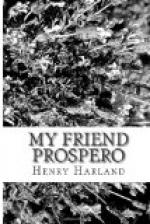“But”—Frau Brandt looked up impressively over her spectacles, and her voice was charged with gravity, for she was about to ask a question to the Teutonic mind of quite supreme importance—“but is he noble?” It was to her what—nay, more than what—the question, “Is he respectable?” would have been to an Englishwoman.
Maria Dolores laughed.
“Oh, no,” she said. “At least I have every reason to believe not, and I devoutly hope not. He belongs I expect to what they call in England the middle class. He has an uncle who is a farmer.”
Frau Brandt’s good old brown eyes showed her profoundly shocked, and expressed profound reprehension.
“But you were speaking with him familiarly—you were speaking with him almost as an equal,” she pronounced in bated accents, in accents of consternation.
Again Maria Dolores laughed.
“True,” she assented gaily, “and that is exactly what I couldn’t do if he were noble. Then I should have to remember our respective positions. But where the difference of rank is so great, one can talk familiarly without fear. Ca n’engage a rien.”
Frau Brandt nodded her head, for full half a minute, with many meanings; she nodded it now up and down, and now shook it sidewise.
“I do not like it,” she said, at last. “Your brother would not like it. It is not becoming. Well, thanks be to Heaven, he is only English.”
“Oh, of course,” agreed Maria Dolores, “if he were Austrian, it would be entirely different.”
“But is it fair to the young man himself?” pursued Frau Brandt. “Is he aware that he is hobanobbing with a Serene Highness? You treat him as an equal. What if he should fall in love with you?”
“What indeed! But he won’t,” laughed Maria Dolores, possibly with a mental reservation.
“Who can tell?” said Frau Brandt. “His eyes, when he looked at you, had an expression. But there is a greater danger still. You are both at the dangerous age. He is good-looking. What if your heart should become interested in him?”
“Oh, in that case,” answered Maria Dolores, lightly, her chin a little in the air, “I should marry him—if he asked me.”
“What!” cried Frau Brandt, half rising from her chair.
“Yes,” said Maria Dolores, cheerfully unexcited. “He is a man of breeding and education, even if he isn’t noble. If I loved a man, I shouldn’t give one thought to his birth. I’m tired of all our Austrian insistence upon birth, upon birth and quarterings and precedencies. If ever I love, I shall love some one just for what he is, for what God has made him, and for nothing else. It wouldn’t matter if his father were a cobbler—if I loved him, I’d marry him.” Her chin higher in the air, she had every appearance of meaning what she said.
Frau Brandt had sunk back in her chair, and was nodding her white-capped old head again.
“Oh, my child, my child,” she grieved. “Will you never rid your fancy of these high-flown, unpractical, romantic whimsies? It all comes of reading poetry.” She herself, good woman, read little but her prayers.




